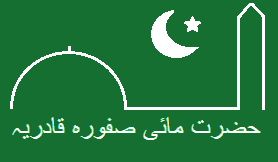Mai Safoora facts for kids
Quick facts for kids
Mai Safoora Qadiriyya
|
|
|---|---|

Arabic Calligraphy
|
|
| Born |
Safoora
Jarala, {in Mughal Empire / Durrani Empire (1747–1826)}
|
| Died | 1795 |
| Other names | 'Rabia Zaman' |
| Education | Religious Education |
| Occupation | Agriculture |
| Era | Durrani Empire (1747–1826) |
| Known for | Sufism, Miracles, Piousness |
| Spouse(s) | Khwaja Noor Muhammad |
| Children | Saleh Muhammad Safoori (son), Saleha (daughter |
| Parent(s) | Rustam Ali |
| Family | Farooqi Qadiri |
Mai Safoora Qadiriyya, also known as Rabia Zaman Mai Safoora, was a very respected and holy Sufi lady from southern Punjab. She was known for her great modesty and deep faith. Even a famous poet named Ali Haider, who first thought women couldn't be Sufis, later accepted her high spiritual position.
Her only son was Noor ud din Muhammad Saleh, also called Saleh Muhammad Safoori (born 1759, died 1832).
Her Life and Times
Mai Safoora was born in a place called Jarala, which is now in Punjab, Pakistan. People say her family came from Arab lands. Her grandfather, Abu'il'Fateh, was an Arab merchant and a Sufi from the Qadiri group.
As a child, she received a good religious education in Islam. She also learned three languages: Punjabi, Persian, and Arabic. Besides her studies, she also gained special spiritual training.
Political Changes During Her Life
When Mai Safoora was born, the Mughal Empire ruled Punjab. But things changed after the death of Nader Shah. In 1747, Ahmad Shah Durrani from Afghanistan became the king. He took over many areas, including Punjab and Sindh, from the weaker Mughals.
This led to the start of the Afghan Durrani Empire, which lasted from 1747 to 1826. Most of Mai Safoora's life happened during this time. Later, Punjab came under the Sikh Empire (1799–1849) and then became part of British India in 1849.
Her Spiritual Journey
Mai Safoora was married to Khawaja Noor Muhammad and had two children. Even while living a normal family life, she was very devoted to her spiritual beliefs. She prayed a lot and was known for her deep faith.
It is believed that she performed several miracles and reached a very high level of faith. After she passed away, her family and local people built a small shrine over her grave. People would visit this shrine to pray and ask for help. After her death, people called her 'Rabia Zaman', meaning 'Rabia of the Age'. This name honored her, comparing her to the famous early Arabic Sufi saint, Rabia Basri.
Her Family
Mai Safoora had two children. Her son's name was Noor-ud-din Muhammad Saleh, also known as Saleh Muhammad Safoori (1759-1832). She also had a daughter named Saleha.
The family members who are descendants of Saleh Muhammad Safoori still live in the same area where Mai Safoora was born, lived, and passed away.
 | James B. Knighten |
 | Azellia White |
 | Willa Brown |

